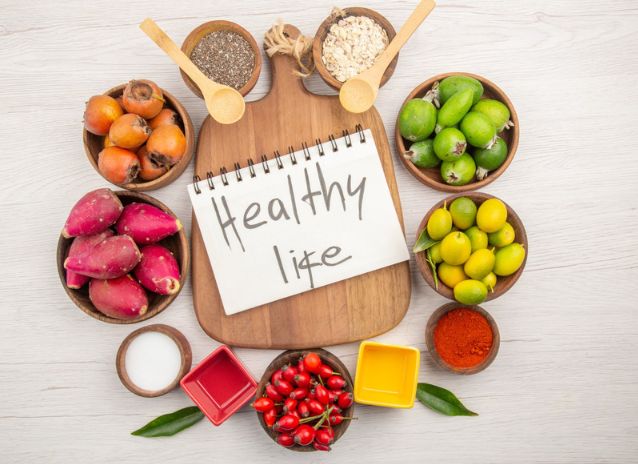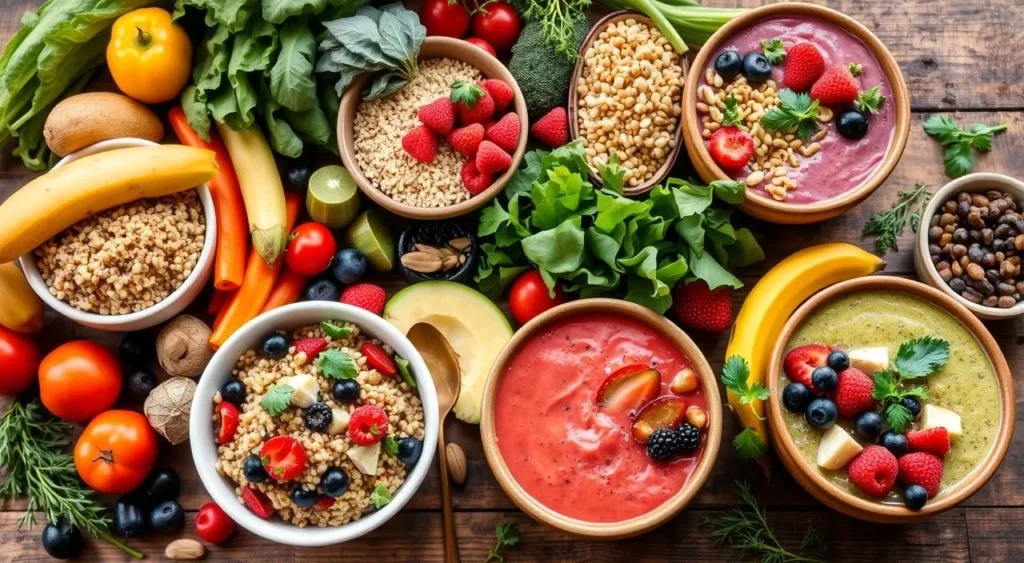In today’s fast-paced world, nutrition plays a vital role in maintaining overall health, boosting energy, and preventing chronic diseases. As we step into 2025, it’s more important than ever to focus on mindful eating, smarter food choices, and balanced nutrition to achieve a healthier lifestyle. At Tastetrove, we believe food is not just fuel but a pathway to better living. This guide explores the Top 10 Nutrition Tips for 2025 that will help you stay strong, energized, and vibrant all year long.
1. Prioritize Whole Foods Over Processed Options
Whole foods like fruits, vegetables, whole grains, nuts, and lean proteins should make up the majority of your diet. Unlike processed foods, which are often loaded with added sugars, unhealthy fats, and artificial ingredients, whole foods provide essential vitamins, minerals, and fiber that promote long-term health.
👉 Want recipe inspiration? Check out our https://tastetrove.net/ for wholesome comfort food ideas.
2. Embrace Plant-Based Nutrition
Plant-based diets are gaining popularity worldwide in 2025, not only for their health benefits but also for sustainability. Incorporating more beans, lentils, tofu, leafy greens, and plant-based proteins can reduce the risk of heart disease, support weight management, and improve digestion.
🌱 External resource: Harvard Health – Plant-Based Diet Benefits

3. Balance Macronutrients Wisely
Your body needs the right balance of carbohydrates, proteins, and healthy fats for optimal performance. Instead of cutting out entire food groups, aim for balance. For example:
- Choose complex carbs like quinoa, oats, and sweet potatoes.
- Add lean protein sources such as chicken, fish, or legumes.
- Include healthy fats like avocado, nuts, and olive oil.
4. Stay Hydrated – Water First!
Hydration is often overlooked, yet it’s one of the most essential aspects of good nutrition. Water supports digestion, nutrient absorption, circulation, and energy levels. In 2025, many people are turning to infused water with lemon, cucumber, or mint as a refreshing and nutritious option.
💧 Pro tip: Aim for at least 8–10 glasses of water daily.
5. Limit Added Sugars and Hidden Sweeteners
Excess sugar is linked to obesity, diabetes, and heart disease. In 2025, sugar alternatives like monk fruit, stevia, and allulose are gaining traction. Always read food labels carefully—many packaged foods hide sugar in sauces, cereals, and dressings.
6. Practice Mindful Eating
In a world filled with distractions, many of us eat without truly paying attention. Mindful eating encourages slowing down, savoring each bite, and listening to hunger cues. This simple practice can help prevent overeating and improve your relationship with food.
7. Prioritize Gut Health with Probiotics and Fiber
Your gut microbiome plays a huge role in digestion, immunity, and even mood regulation. Foods rich in probiotics (like yogurt, kefir, sauerkraut, and kimchi) combined with fiber-rich foods (whole grains, beans, and vegetables) keep your gut balanced and healthy.
🍶 You may also like our article on Yogurt Recipes for gut-friendly meal ideas.
8. Eat Seasonal and Local Produce
In 2025, sustainability and local farming are more important than ever. Choosing seasonal and locally grown foods ensures freshness, reduces your carbon footprint, and provides maximum nutritional value. Farmers’ markets are excellent places to find organic produce.
9. Plan and Prep Your Meals
Busy lifestyles often lead to unhealthy eating choices. Meal prepping for the week ensures that you have access to healthy options at all times. Try preparing simple meals like grilled chicken with roasted vegetables or lentil salads to stay on track with your nutrition goals.
10. Personalize Nutrition with Modern Tools
Technology is changing the way we approach nutrition in 2025. Apps and wearable devices now help track calorie intake, hydration levels, and nutrient balance. Personalized nutrition plans—based on genetics and lifestyle—are becoming increasingly popular for optimal health outcomes.
FAQs About Nutrition in 2025
1. What is the best diet for long-term health?
There’s no one-size-fits-all. The best diet includes whole foods, lean proteins, healthy fats, and a variety of fruits and vegetables, while limiting processed foods and added sugars.
2. How does nutrition affect mental health?
Good nutrition supports brain health. Omega-3 fatty acids, antioxidants, and B-vitamins help improve focus, memory, and mood regulation.
3. Can I still enjoy my favorite foods while eating healthy?
Yes! Nutrition is about balance, not restriction. Enjoy your favorite treats in moderation while focusing on nutrient-dense meals.
4. What are the best superfoods in 2025?
Some trending superfoods include quinoa, chia seeds, blueberries, turmeric, and plant-based proteins.
5. Should I take supplements in 2025?
Supplements can help if you have specific nutrient deficiencies, but most people can get what they need from a balanced diet. Always consult with a healthcare provider first.
Recommended Nutrition Products in 2025
Here are some top-rated products that support a healthier lifestyle:
- Vitamix High-Performance Blender – Perfect for smoothies, soups, and sauces.
- Fitbit Smartwatch – Tracks nutrition, hydration, and activity levels.
- Organic Meal Prep Containers – Helps organize weekly meals.
- Garden of Life Multivitamins – Whole-food-based supplements for daily support.
Final Thoughts
Nutrition in 2025 is not about quick fixes—it’s about sustainable, mindful choices that nourish both the body and mind. By focusing on whole foods, balancing macronutrients, staying hydrated, and embracing mindful eating, you can achieve a healthier lifestyle and prevent chronic illness.
At Tastetrove, we encourage you to use these Top 10 Nutrition Tips as a roadmap to better living. Remember: small changes every day lead to big results over time.

✅ Additional FAQs About Nutrition
6. How many meals should I eat per day for good nutrition?
There isn’t a single answer—some thrive on three balanced meals, while others prefer 5–6 smaller meals. The key is consistency and focusing on nutrient-rich foods.
7. Is intermittent fasting a good nutrition strategy in 2025?
Yes, many people find success with intermittent fasting, but it’s not for everyone. It may help regulate blood sugar, support weight management, and improve metabolic health. Always consult a professional before starting.
8. What role does protein play in nutrition?
Protein supports muscle growth, tissue repair, and hormone production. Include a mix of animal and plant-based proteins in your diet for best results.
9. Are organic foods worth it?
Organic foods may have fewer pesticides and higher nutrient content. If budget is a concern, prioritize organic for produce on the “Dirty Dozen” list (like strawberries, spinach, and apples).
10. How important is portion control for nutrition?
Portion control prevents overeating and ensures you’re consuming the right balance of nutrients. Using smaller plates and listening to hunger cues can help.
✅ Recommended Products for Better Nutrition in 2025
Here are some useful nutrition-friendly products to make healthy eating easier:
- NutriBullet Pro Plus Blender – Great for smoothies, protein shakes, and nutrient-packed drinks.The NutriBullet Pro Plus Blender is one of the most popular kitchen tools for anyone looking to improve their nutrition in 2025. Designed with powerful 1200-watt blending technology, it effortlessly breaks down fruits, vegetables, nuts, and seeds into smooth, nutrient-rich shakes and smoothies. This blender is perfect for busy lifestyles, making it easy to prepare quick post-workout drinks, protein shakes, or breakfast smoothies in minutes. Its compact design, durable blades, and easy-to-clean cups make it a must-have for health-conscious individuals who want to maximize nutrition without spending hours in the kitchen.
- Meal Prep Bento Boxes (Reusable) – Keeps meals portioned and organized throughout the week.Meal Prep Bento Boxes (Reusable) are a game-changer for anyone aiming to stay consistent with healthy eating in 2025. These eco-friendly containers are designed with multiple compartments, allowing you to portion out proteins, vegetables, grains, and snacks in a balanced way. By prepping meals ahead of time, you can save money, reduce food waste, and avoid unhealthy last-minute choices. Durable, microwave-safe, and dishwasher-friendly, reusable bento boxes make nutrition simple, organized, and portable—perfect for work, school, or on-the-go lifestyles.
- Brita Water Pitcher with Filter – Encourages hydration with clean, fresh-tasting water.The Brita Water Pitcher with Filter is an essential tool for better hydration and nutrition in 2025. Clean, great-tasting water is the foundation of a healthy lifestyle, and Brita makes it simple by reducing chlorine, lead, and other common tap water impurities. Its sleek, space-saving design fits easily in most refrigerators, encouraging you to drink more water throughout the day. With reusable filters that last for weeks, the Brita pitcher is also an eco-friendly choice, cutting down on single-use plastic bottles while ensuring you always have refreshing water on hand for cooking, smoothies, or daily hydration.
- Organic Superfood Powders (Spirulina, Matcha, Maca) – Add extra nutrients to smoothies or snacks.Organic Superfood Powders like Spirulina, Matcha, and Maca are becoming essential nutrition boosters in 2025. Spirulina, a nutrient-dense blue-green algae, is packed with protein, vitamins, and antioxidants that support energy and immune health. Matcha, a finely ground green tea powder, provides a steady caffeine boost along with powerful antioxidants to promote focus and metabolism. Maca root powder is valued for balancing hormones, increasing stamina, and supporting overall vitality. These superfood powders can easily be added to smoothies, oatmeal, or baked goods, making them a convenient way to elevate daily nutrition with minimal effort.
- Digital Food Scale – Helps track portions and maintain balanced nutrition.A Digital Food Scale is a must-have kitchen tool for anyone serious about nutrition and portion control in 2025. By providing precise measurements of ingredients, it helps you track calories, macronutrients, and serving sizes with accuracy. Whether you’re meal prepping, following a fitness plan, or simply aiming to eat more mindfully, a digital scale eliminates guesswork and supports consistent results. Most modern models are lightweight, easy to clean, and come with features like unit conversion and tare functions, making them practical for both beginners and seasoned home cooks who want to maintain balanced nutrition.
- Kombucha Starter Kit – Boosts gut health with probiotic-rich homemade drinks.A Kombucha Starter Kit is the perfect way to boost gut health and incorporate probiotics into your diet in 2025. These kits provide everything you need to brew your own kombucha at home, including a SCOBY (symbiotic culture of bacteria and yeast), starter tea, and detailed instructions. Making kombucha at home ensures freshness, allows customization of flavors, and is far more cost-effective than store-bought options. Rich in probiotics, antioxidants, and beneficial acids, homemade kombucha supports digestion, immunity, and overall wellness, making it a delicious and practical addition to a health-conscious lifestyle.
- Olive Oil Dispenser with Spray Nozzle – Controls oil usage for healthier cooking.The Olive Oil Dispenser with Spray Nozzle is an essential tool for healthier cooking in 2025. It allows you to evenly coat pans, salads, or roasted vegetables with just the right amount of oil, helping reduce excess calories while retaining flavor. Its easy-to-use spray mechanism ensures precise portion control, making it perfect for those who are mindful of fat intake and overall nutrition. Made from durable, BPA-free materials, this dispenser is both eco-friendly and easy to clean, making it a practical addition to any kitchen focused on healthy, balanced meals.
- Fitbit Versa 4 or Apple Watch Series 10 – Monitors nutrition, hydration, and activity levels.The Fitbit Versa 4 and Apple Watch Series 10 are powerful wearable devices that take nutrition and health tracking to the next level in 2025. Both devices monitor activity, heart rate, sleep patterns, and hydration, helping you make smarter lifestyle choices. With integrated apps for calorie tracking, meal logging, and workout guidance, these smartwatches provide real-time insights into your daily nutrition and fitness goals. Sleek, durable, and user-friendly, they are perfect companions for anyone looking to maintain a healthier lifestyle, stay motivated, and track progress with precision.
- Garden of Life Raw Organic Protein Powder – Plant-based protein with added probiotics.The Garden of Life Raw Organic Protein Powder is a top choice for health enthusiasts looking to boost their protein intake naturally in 2025. Made from a blend of organic plant-based proteins, including peas, sprouts, and seeds, it provides a complete amino acid profile to support muscle growth, recovery, and overall vitality. Fortified with probiotics and enzymes, this protein powder also aids digestion and gut health. With no artificial additives or sweeteners, it’s a clean, nutritious option that can be easily added to smoothies, oatmeal, or baked goods, making it a convenient way to enhance daily nutrition while maintaining a balanced, wholesome diet.
- Stainless Steel Lunchbox – Eco-friendly way to pack fresh meals for work or schoo.The Stainless Steel Lunchbox is a durable and eco-friendly solution for packing healthy meals on the go in 2025. Made from high-quality, BPA-free stainless steel, it keeps food fresh without absorbing odors or stains, unlike plastic containers. Its sturdy design and secure lids make it perfect for portioning balanced meals, whether for work, school, or travel. Reusable and easy to clean, this lunchbox not only supports mindful eating and meal prep but also reduces single-use packaging waste, making it a practical choice for health-conscious and environmentally aware individuals.l.
Other Related FAQs About Nutrition
11. What is the difference between nutrition and diet?
Nutrition focuses on the nutrients your body needs for health, while diet refers to the overall pattern of foods and drinks you consume daily.
12. How does nutrition affect fitness performance?
Proper nutrition fuels workouts, speeds up recovery, and builds strength. Athletes often need extra protein, hydration, and electrolytes to perform at their best.
13. What are some kid-friendly nutrition tips?
Encourage kids to eat a rainbow of fruits and vegetables, choose whole grains, and limit sugary snacks. Fun presentations—like fruit skewers or smoothie bowls—make healthy eating exciting.
14. Are low-carb diets still effective in 2025?
Yes, but with a smarter approach. Instead of extreme carb-cutting, modern low-carb diets emphasize complex carbs, healthy fats, and lean proteins for balance.
15. Can good nutrition prevent chronic diseases?
Absolutely. A diet rich in whole foods, healthy fats, lean protein, and fiber can help reduce the risk of heart disease, diabetes, obesity, and even certain cancers.
16. What is the role of antioxidants in nutrition?
Antioxidants (like vitamin C, vitamin E, and beta-carotene) fight free radicals in the body, reducing inflammation and slowing aging. Foods like berries, nuts, and leafy greens are antioxidant-rich.
17. Is coffee considered good or bad for nutrition?
In moderation, coffee can improve focus, boost metabolism, and provide antioxidants. However, adding too much sugar or cream can reduce its health benefits.
18. What is the importance of fiber in daily nutrition?
Fiber aids digestion, regulates blood sugar, supports gut health, and helps with weight control. Adults should aim for at least 25–30 grams daily.
19. Are supplements necessary if I eat healthy?
Not always. If your diet is well-rounded, supplements may not be needed. But vitamin D, B12, and omega-3s are commonly supplemented, especially in plant-based diets.
20. How can I make healthy eating more affordable?
Buy seasonal produce, shop at local markets, use frozen fruits/vegetables, and plan meals ahead to avoid waste.
More Top Related FAQs
21. How can I make my diet more sustainable in 2025?
Focus on plant-based foods, seasonal produce, and locally sourced ingredients. Reducing food waste and choosing eco-friendly packaging also contributes to sustainable nutrition.
22. What are the best snacks for healthy nutrition?
Opt for nuts, seeds, fruit, Greek yogurt, or veggie sticks with hummus. These provide energy, fiber, and protein without excessive sugar or unhealthy fats.
23. How can I track my daily nutrition effectively?
Use apps like MyFitnessPal, Cronometer, or Fitbit to log meals, track calories, macronutrients, and hydration. Tracking helps maintain balance and identify gaps in your diet.
24. Is meal prepping worth it for a healthier lifestyle?
Yes, meal prepping saves time, reduces stress, and prevents impulsive unhealthy eating. It ensures balanced meals are ready to eat throughout the week.
25. How much protein do I need daily in 2025?
Protein needs vary by age, activity level, and health goals. On average, adults require 0.8–1.2 grams of protein per kilogram of body weight, with athletes or highly active individuals needing more.

26. Can good nutrition improve sleep quality?
Absolutely. Foods rich in magnesium, tryptophan, and antioxidants—like leafy greens, nuts, and whole grains—can support better sleep patterns and overall recovery.
27. Are plant-based protein sources as effective as animal-based ones?
Yes, when combined correctly. Foods like lentils, chickpeas, quinoa, nuts, and seeds provide complete amino acids necessary for muscle repair and overall health.
28. How do I stay motivated to follow a healthy nutrition plan?
Set realistic goals, track progress, prepare meals ahead, and include occasional treats to avoid burnout. Support from apps, friends, or communities also helps maintain motivation.
29. What are some nutrition trends to watch in 2025?
Trends include personalized nutrition plans, functional foods (probiotics, adaptogens), plant-based diets, and low-sugar alternatives to support holistic health.
30. How does hydration fit into a healthier lifestyle?
Staying hydrated supports digestion, metabolism, cognitive function, and energy. Aim for 8–10 glasses of water daily, and consider infused water for added flavor and nutrients.
